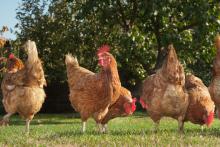Cracking the Code

This post is an installment in our 52 Health Hinges series. Remember, “Small hinges swing big doors.”
Last week, we got down and dirty with the benefits (and potential pitfalls) of eggs.
Now – I know you want to buy the healthiest eggs for your family, but all of the different eco-labeling can make things confusing.
Here’s a guide on how to read egg labels:
Conventional eggs: These are your standard supermarket eggs – typically, the lowest cost eggs available. They’re from chickens likely fed genetically modified grains and soy that contains pesticides and herbicides. The chickens tend to be caged and packed in tight quarters (one chicken is provided space roughly equivalent to a piece of paper), so exercise is limited. Antibiotics are often used.
Organic eggs: These eggs come from chickens guaranteed to have eaten only organic feed and are certified to be antibiotic-free.
No added hormones: The FDA banned additive hormones in chicken feed over 50 years ago. So when you see a “No added hormones,” claim, it’s a marketing ploy. Additionally, this claim doesn’t tell us how the chicken lived (if not specifically mentioned otherwise, it’s likely that the chicken was caged).
Vegetarian eggs: A chicken’s natural diet includes bugs and worms (and sometimes even snakes!), and they need protein to develop properly, so – in my opinion – labeling eggs as vegetarian-fed is again, nothing more than a marketing gimmick. Preventing the chicken from consuming its natural diet prevents them from optimal health.
Cage-free: These chickens don’t live in cages, but this designation alone doesn’t tell us if they have access to the outdoors or the quality of their diet.
Free range: This means that the chickens have access to the outdoors, and can go outside as they choose, but this could mean as little as 5 minutes a day or not at all.
Pastured: Ah – now this is how a chicken is meant to live! (The saying “free as a bird” comes to mind!) These chickens have plenty of access to the outdoors where they can eat grass (providing a higher vitamin E and carotene content), insects (providing a higher DHA content), and worms and bask in the sun.
“Compared to eggs from conventionally raised, caged hens, eggs produced by free-roaming and pasture-pecking chickens have more omega-3 fatty acids, vitamin E and vitamin A, along with notably higher amounts of folic acid and vitamin B12. Direct sunlight also acts as a nutrient and naturally boosts egg production.” (Source)
Here’s a great 5-minute video discussing the best ways to raise chickens to produce the healthiest eggs.
Color Matters?
I get asked a lot if the color of the egg matters. The question is usually in regard to the eggshell (e.g. “Are brown eggs better for me?”) The answer is no – the color of the eggshell doesn’t reflect the nutritional value; it only indicates the breed of the hen.
But there is a color that DOES matter – that’s the color of the yolk! The deeper orange the yolk, the better quality and fresher the eggs and the higher lutein and zeaxanthin content – antioxidants that are important for vision and eye health.
Where to Buy
The best source of eggs I’ve found is my local farmers’ markets. Ask the farmer how the chickens lived, and if they were able to eat their natural diet including grass and insects.
Additionally, if you’re in the US, you can visit localharvest.org or eatwild.com to find sources close to you.
If You Want to Take Things Further…
We feel that being informed about food labeling – not just egg labels – is critically important. Jill G. spent a few years working for a sustainable agriculture organization and know this stuff.
As she says, “The glut of eco labels on food can breed confusion. These labels claim to be good for you and the environment, but how do you know if the products are delivering on their promises? How do you know when you’re being hoodwinked and when you can trust labels on food packaging? Is organic really the gold standard?”
Jill breaks it all down in this recorded class that she taught at the University of Minnesota’s College of LearningLife. You can keep from getting hoodwinked for just a few bucks. :)
Add comment